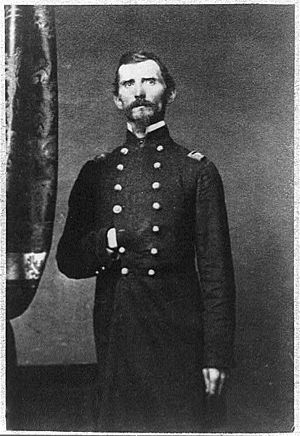George Francis McGinnis facts for kids
Quick facts for kids
George F. McGinnis
|
|
|---|---|

George Francis McGinnis
|
|
| Born | 19 March 1826 Boston, Massachusetts |
| Died | 29 May 1910 (aged 84) Indianapolis, Indiana |
| Place of burial |
Crown Hill Cemetery, Indianapolis, Indiana
|
| Allegiance | United States of America Union |
| Service/ |
United States Army Union Army |
| Years of service | 1846–1847, 1861–1865 |
| Rank | |
| Commands held | 11th Indiana Volunteer Infantry Regiment |
| Battles/wars | Mexican–American War American Civil War |
| Other work | hatter, postmaster of Indianapolis |
George Francis McGinnis (born March 19, 1826 – died May 29, 1910) was a brave soldier. He fought in two important wars for the United States. First, he was a volunteer in the Mexican–American War. Later, he became a General for the Union Army during the American Civil War.
Contents
Early Life of George McGinnis
George McGinnis was born in Boston, Massachusetts. When he was a baby, his mother passed away. He lived with his aunt for some time. At age 11, George and his father moved to Ohio. His father worked as a hatter, making hats.
Joining the Mexican-American War
While living in Ohio, a war started with Mexico. George decided to volunteer and join the army. He became a lieutenant in the 2nd Ohio Volunteer Infantry. By 1847, he had become a captain. After the war, he returned to Ohio and continued working as a hatter.
George McGinnis in the Civil War
When the American Civil War began, George McGinnis quickly volunteered again. He joined the 11th Indiana Volunteer Infantry Regiment. This regiment was being formed by Colonel Lew Wallace.
Fighting in Western Virginia
Within just one month, George quickly moved up in rank. He went from being a private soldier to a captain. Then, on April 25, he became a lieutenant colonel. George and the 11th Indiana Regiment took part in a raid. This raid happened in Romney, West Virginia, on June 13, 1861.
Battles at Fort Donelson and Shiloh
After their first three-month enlistment ended, the regiment signed up again. On August 31, 1861, George McGinnis was again made lieutenant colonel. Colonel Wallace was still in charge. Their special training made the regiment known as "Wallace's Zouaves."
On September 3, Wallace was promoted to brigadier general. This meant George McGinnis became the colonel of the regiment. He led his soldiers during the capture of Fort Henry. Then they marched overland to Fort Donelson.
Heroism at Fort Donelson
During the Battle of Fort Donelson, George's regiment joined Lew Wallace's division. They fought bravely in a counterattack on the Union side. Lew Wallace praised George for his actions in this battle. George also led his regiment in the battles of Shiloh and Corinth.
The Vicksburg Campaign
On April 4, 1863, George McGinnis received a big promotion. He became a brigadier general of volunteers. He was put in charge of a brigade in Arkansas. After some time on guard duty, he got a new command.
Key Role at Champion Hill
George was appointed to lead the 1st Brigade. This brigade was part of the 12th Division. This division was led by General Alvin Peterson Hovey. George's brigade fought very hard in the Battle of Champion Hill. They showed great courage and skill.
The Siege of Vicksburg
During the siege of Vicksburg, his troops held a part of the siege lines. This was in the middle of the Union army, near Fort Garrott. Today, a bronze plaque of George McGinnis marks this spot.
After Vicksburg fell, George McGinnis had less important commands. This might have been because of his connections. Generals McClernand and Wallace had become unpopular. They were not liked by General Ulysses S. Grant.
George McGinnis later commanded the 3rd Division for most of 1864. In the winter of 1864–1865, he moved again. He was transferred to command the "Forces on the White River." This was a smaller command. It mainly guarded the mouth of the White River.
Later Life and Public Service
George McGinnis left the volunteer army on August 24, 1865. He moved to Indianapolis, Indiana. There, he started a business. He also held several local political jobs.
From 1867 to 1871, he worked as the auditor for Marion County. An auditor checks financial records. In 1900, he was appointed postmaster of Indianapolis. This meant he was in charge of the city's mail.
George McGinnis passed away on May 29, 1910, in Indianapolis. He is buried in Crown Hill Cemetery in that city.
Images for kids
-
Bronze relief portrait of McGinnis by T.A.R. Kitson at Vicksburg National Military Park
 | Audre Lorde |
 | John Berry Meachum |
 | Ferdinand Lee Barnett |


